Related Research Articles

Josip Broz, commonly known as Tito, was a Yugoslav communist revolutionary and statesman, serving in various roles from 1943 until his death in 1980. During World War II, he was the leader of the Yugoslav Partisans, often regarded as the most effective resistance movement in German-occupied Europe. He also served as the president of the Socialist Federal Republic of Yugoslavia from 14 January 1953 until his death on 4 May 1980.
The Anti-Fascist Council for the National Liberation of Yugoslavia commonly abbreviated as the AVNOJ, was a deliberative and legislative body that was established in Bihać, Yugoslavia, in November 1942. It was established on the instigation of Josip Broz Tito, the leader of the Yugoslav Partisans – an armed resistance movement led by the Communist Party of Yugoslavia to resist the Axis occupation of the country during World War II.

Milovan Djilas was a Yugoslav communist politician, theorist and author. He was a key figure in the Partisan movement during World War II, as well as in the post-war government. A self-identified democratic socialist, Djilas became one of the best-known and most prominent dissidents in Yugoslavia and all of Eastern Europe. During an era of several decades, he critiqued communism from the viewpoint of trying to improve it from within; after the revolutions of 1989 and the violent breakup of Yugoslavia, he critiqued it from an anti-communist viewpoint of someone whose youthful dreams had been disillusioned.
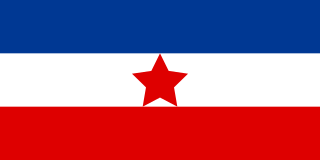
The Yugoslav Partisans, or the National Liberation Army, officially the National Liberation Army and Partisan Detachments of Yugoslavia, was the Communist-led Anti-fascist resistance to the Axis powers in occupied Yugoslavia during World War II. Led by Josip Broz Tito, the Partisans are considered to be Europe's most effective anti-Axis resistance movement during World War II.

The League of Communists of Yugoslavia, known until 1952 as the Communist Party of Yugoslavia, was the founding and ruling party of SFR Yugoslavia. It was formed in 1919 as the main communist opposition party in the Kingdom of Serbs, Croats and Slovenes and after its initial successes in the elections, it was proscribed by the royal government and was at times harshly and violently suppressed. It remained an illegal underground group until World War II when, after the Invasion of Yugoslavia in 1941, the military arm of the party, the Yugoslav Partisans, became embroiled in a bloody civil war and defeated the Axis powers and their local auxiliaries. After the liberation from foreign occupation in 1945, the party consolidated its power and established a one-party state, which existed until the 1990 breakup of Yugoslavia.
The Department for People's Protection or OZNA was the security agency of Communist Yugoslavia that existed between 1944 and 1946.
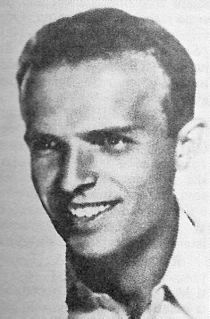
Rade Končar was a Croatian Serb politician and leader of the Yugoslav Partisans in the Independent State of Croatia and Dalmatia during the early stages of World War II in Yugoslavia. He became a member of the Communist Party of Yugoslavia (KPJ) in 1934 and was arrested in 1936 when the Belgrade branch of the party was banned by Yugoslav authorities. After serving one year of hard labour in Sremska Mitrovica prison he was released and elected political secretary of the central committee of the Communist Party of Croatia (KPH) in Zagreb. In October 1940, he was made a member of the central committee of the KPJ at the Fifth National Conference of the Communist Party of Yugoslavia.
The State Anti-Fascist Council for the National Liberation of Croatia, commonly abbreviated ZAVNOH, was first convened on 13–14 June 1943 in Otočac and Plitvice as the chief political representative body in World War II Axis-occupied Croatia. It was dominated by the Communist Party of Croatia, a nominally-independent political party active in the territory largely corresponding to present-day Croatia. Despite its nominal independence, the party was a de facto branch of the Josip Broz Tito-led Communist Party of Yugoslavia. ZAVNOH also included representatives or former members of peasant organisations, trade unions, the Croatian Peasant Party, and the Independent Democratic Party.
Marija Bursać was a member of the Yugoslav Partisans during World War II in Yugoslavia and the first woman proclaimed a People's Hero of Yugoslavia. Bursać was born to a Bosnian Serb farming family in the village of Kamenica, near Drvar. After the invasion of Yugoslavia by the Axis powers and their creation of the Independent State of Croatia in April 1941, Bursać supported the Partisan resistance movement led by the Communist Party of Yugoslavia (KPJ). Like other women in her village, she collected food, clothing, and other supplies for the Partisan war effort. Bursać became a member of the League of Communist Youth of Yugoslavia in September 1941. The following August she was appointed political commissar of a company of the 1st Krajina Agricultural Shock Brigade, which harvested crops in the Sanica River valley, and was admitted to the KPJ at the end of that summer.
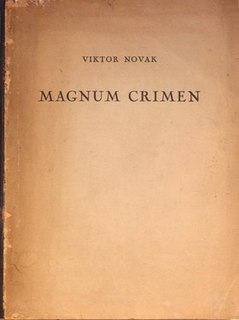
The Magnum Crimen is a book about clericalism in Croatia from the end of 19th century until the end of the Second World War. The book, whose full title is Magnum crimen – pola vijeka klerikalizma u Hrvatskoj, was written by a former Catholic priest and a professor and historian at Belgrade University, Viktor Novak (1889–1977). The book was first published in Zagreb in 1948.
The State Anti-fascist Council for the National Liberation of Bosnia and Herzegovina, commonly abbreviated as the ZAVNOBiH, was convened on 25 November 1943 in Mrkonjić Grad during the World War II Axis occupation of Yugoslavia. It was established as the highest representative and legislative body in the territory of Bosnia and Herzegovina under control of the Yugoslav Partisans.

Vladimir Popović Lukin, also known as Vlado Popović, was a Yugoslav diplomat, communist politician and army general. He was a close associate of Josip Broz Tito. He was, during his career, a delegate to the UN, close associate of Josip Broz Tito, Yugoslavia's envoy (ambassador) to the USSR, US, China, and Vietnam, member of the federal government of Yugoslavia, and chair of the Committee for Foreign Affairs of the Federal Assembly of Yugoslavia, and secretary to the presidency until his death in 1972.

Aćif Hadžiahmetović, known as Aćif Bljuta, was an Albanian politician in the Sanjak of Novi Pazar region of the Kingdom of Yugoslavia in the interwar period and during World War II. In the interwar period he was mayor of Novi Pazar and a deputy of Džemijet following the 1923 elections. After the Axis invasion of Yugoslavia in April 1941, he was appointed mayor of Novi Pazar under the German military government of the Territory of the Military Commander in Serbia and in 1943–44 was a deputy of Mitrovica in the Albanian parliament. He was also a member of the central committee of the Second League of Prizren. Towards the end of the war, he was executed by the Yugoslav Partisans for his collaboration with the Axis for massive war crimes against Serbs and killings of Albanians who were against his rule.
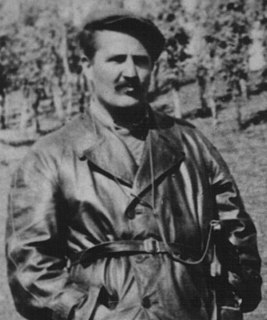
Miladin Popović was a Yugoslav Partisan and secretary of the Regional Committee of the Communist Party of Yugoslavia of Kosmet (Kosovo). He was one of the organizers of the partisan fighting in Kosovo. He was posthumously given the Hero of Yugoslavia award.
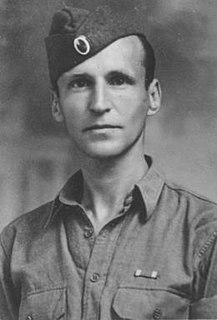
Žarko P. Todorović "Valter" was one of the leaders of the Chetnik resistance in the first phase of World War II in the German occupied Yugoslavia, serving as first commander of the undercover Chetnik headquarters in Belgrade.

The Croatian Partisans, officially the National Liberation Movement in Croatia, were part of the Communist-led Yugoslav Partisans, a guerrilla force in the Axis-occupied Yugoslavia that fought against the Axis-powers forces and Serbian royalists from July 1941 until May 1945 during World War II, across the territory of the Axis-allied Independent State of Croatia (NDH). Croatian Partisan units succeeded in temporarily or permanently liberating considerable parts of Croatia from Axis forces. The defeat of the NDH in mid-May 1945 was followed by mass killings of Croat prisoners and others at the hands of the Communist forces and the establishment later that year of a pro-Soviet one-party Communist Federal People's Republic of Yugoslavia, the People's Republic of Croatia being one of its constituent republics.
Ivan Srebrenjak or Srebrnjak ran a Soviet intelligence network for the NKVD in the Balkans at the beginning of Axis occupation of Yugoslavia.

The Attack on Kruševac was attack of Yugoslav rebels on Axis-held Kruševac in the German-occupied territory of Serbia which lasted between 23 and 27 September 1941 during World War II.

The Drvar uprising was the World War II uprising of the Serb population of Bosnian Krajina. Italy supported it, both politically and in arms, in its struggle against the fascist puppet state of the Independent State of Croatia between 27 July and 26 September 1941.
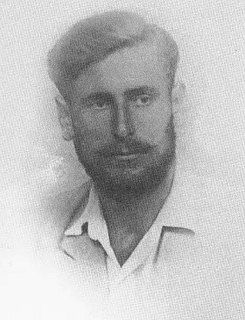
Danilo "Dane" Stanisavljević was a Croatian Serb revolutionary who was one of the leaders of the uprising of Serbs in Lika against the Independent State of Croatia and later a military officer of the Chetnik units with the rank of voivode.
References
- ↑ ( Jelić 1984 , p. 7):"..Pitanje utvrđivanja sudionika Savjetovanja usko je povezano s pitanjem same svrhe toga sastanka I priprema za nj. Riječ je o tome da su sastancima članova CK KPJ i Ci<L KPH, kojih je bilo nekoliko u toku travnja, prisustvovali oni članovi koji su se nalazili u Zagrebu. ,..."
- ↑ ( Jelić 1984 , p. 7):"..Po svoj prilici je na toj sjednici III ubrzo nakon nje donesena odluka o sazivanju širega jpartljskog savjetovanja na koje bi se pozvali predstavnici nacionalnih I pokrajinskih loikovodstava. ,..."
- ↑ ( Jelić 1984 , p. 7):"...nema povratka na staro, na staru Jugoslaviju u kojoj su radne mase bile ugnjetene i' eksploatisane, a narodi obespravljeni,..."
- ↑ ( Jelić 1984 , p. 2)
- ↑ ( Jelić 1984 , p. 3):"Bez ikakvih novih argumenata Iskonstruirao je kvalitetno nove podatke o Savjetovanju, dovodeći u sumnju njegovo održavanje"
- ↑ ( Đuretić 1997 , p. 42)
- ↑ ( Jelić 1984 , p. 3):"Tvrdnja da se u spomenutim primarnim dokumentima »zbog konspiracije« nije dao tobožnji pravi datum, tj. da je Savjetovanje održano potkraj travnja, nema nikakve čvršće osnove"
- ↑ Fourteen Centuries of Struggle for Freedom. Military Museum. 1968. pp. xxviii.
In early May, 1941, at the initiative of Josip Broz Tito, a Consultation of the Yugoslav Communist Party was held in Zagreb, attended by delegates from almost all parts of Yugoslavia.
- ↑ ( Jelić 1984 , p. 8):"...Najprije treba konstatirati da su Savjetovanju prisustvovali svi članovi Političkog biroa Centralnog komiteta KPJ osim Aleksandra Rankovića. To znači da su na tom sastanku bili: Josip Broz Tito, generalni sekretar KPJ, Edvard Kardelj, Rade Končar, Ivan Milutinović, Franc Leskošek i Milovan Đilas.^..."
- ↑ ( Glišić & Borković 1975 , p. 24):"... Александар Ранковић. Он је око три месеца вршио дужност секретара ЦККПЈ Хрватске,"
- ↑ ( Jelić 1984 , p. 9):"Prema sjećanju člana Pokrajinskog komiteta Blagoja Neškovića, »od članova PK Srbije niko nije išao na sastanak u Zagreb posle 6. aprila«"
- ↑ ( Jelić 1984 , p. 10):".*U relevantnoj povijesnoj literaturi također nema spomena o tome da je netko iz PK KPJ za Srbiju prisustvovao Savjetovanju"
- ↑ ( Vujnović 1986 , p. 24):"Pošto je sekretar pokrajinskog komiteta KPJ za Makedoniju odbio da njegovi predstavnici učestvuju na Majskom savetovanju u Zagrebu i raspuštanjem Pokrajinskog komiteta u maju,.."
- ↑ ( Perazić 2001 , p. 62):"Одбио је да дође на мајско саветовање 1941 . године , изјавивши да је партијска организација Македоније саставни део Бугарске радничке партије . На тај начин он се сагласио са аспирацијама великобугарских фашиста"
- ↑ ( Nikolić 2000 , p. 185)
- ↑ ( Nikolić 2000 , p. 185)
- ↑ ( Nikolić 2000 , p. 185):" На другој су били " разуларени енглески ратни хушкачи и великосрпски шовинисти који са својим провокацијама гурају земљу у ратни покољ...""
- ↑ ( Jelić 1984 , p. 18):" Istina je da smo mi protiv takve 'Nezavisne Države↵Hrvatske' kakva je danas, kakvu su skrpili Pavelić i njegova bratija zajedno sa Mussolinijem i Hitlerom, jer to nije nikakva nezavisna država Hrvatska, nego obična talijanska provincija, objekt pljačke njemačkih i talijanskih imperijalističkih razbojnika. Protiv takve 'nezavisne' države Hrvatske nismo samo mi, već i 99 posto hrvatskog naroda.«"
- ↑ ( Jelić 1984 , p. 8):"Jedna od bitnih i najznačajnijih ocjena rukovodstva KPJ na Savjetovanju sastojala se u odlučnom suprotstavljanju svim optužbama koje su potjecale iz velikosrpskih krugova: da hrvatski narod snosi glavnu krivicu za »brzu kapitulaciju jugoslavenske vojske«. "
- ↑ ( Jelić 1984 , p. 8):"Majsko savjetovanje posebnu je pozornost obratilo analizi uzroka onako munjevitog sloma Kraljevine Jugoslavije u travanjskom ratii. U toj je analizi rukovodstvo KPJ istaklo nekoliko presudnih činilaca: politiku nacionalnog tlačenja koju su provodili režimi velikosrpske buržoazije više od _dvadeset godina; "
- ↑ ( Jelić 1984 , p. 8):" kao što nema ništa zajedničko ni srpski narod sa izdajničkom klikom vladajuće srpske gospode."
- ↑ ( Jelić 1984 , p. 8):" Ali srpski narod predobro zna da je glavni krivac sadašnje njegove tragedije, kao i tragedije svih naroda Jugoslavije, baš srpska reakcionarna vladajuća buržoazija i nju će u prvom redu pozvati na odgovornost kada za to kucne čas. Ona je glavni krivac svega zla koje je zadesilo kako srpski tako i ostale narode Jugoslavije.« "
- ↑ ( Jelić 1984 , p. 8):" KP je odlučno odbijala optužbe, koje joj je tada upućivala ustaška propaganda, da su komunisti »protiv nezavisnosti hrvatskog naroda«. U vezi s tim u zaključcima Savjetovanja ističe se: »Razumije se da je to obična laž i kleveta. Mislimo da je dovoljno dobro poznato većini hrvatskog naroda, a i nekim frankovcima koji su sjedili na robiji zajedno s komunistima, da smo mi, komunisti, baš zbog toga i navukli veliku mržnju na sebe od strane velikosrpske buržoazije što smo se borili za nacionalno oslobođenje ugnjetenih naroda Jugoslavije, a u prvom redu hrvatskog naroda"
- ↑ ( Jelić 1984 , p. 8):" Istina je da smo mi protiv takve 'Nezavisne Države Hrvatske' kakva je danas, kakvu su skrpili Pavelić i njegova bratija zajedno sa Mussolinijem i Hitlerom, jer to nije nikakva nezavisna država Hrvatska, nego obična talijanska provincija, objekt pljačke njemačkih i talijanskih imperijalističkih razbojnika. Protiv takve 'nezavisne' države Hrvatske nismo samo mi, već i 99 posto hrvatskog naroda.«"
- ↑ ( Jelić 1984 , p. 1):"Nije sačuvan dokument o ovom savetovanju, nije poznat ni tačan datum njegovog održavanja, kao ni zgrada u kojoj se zasedalo i sastav učesnika"
- ↑ ( Jelić 1984 , p. 1):"ni ti dokumenti nisu neposredni rezultat rada Savjetovanja u formalnom smislu riječi,...ne postoje neki dokumenti koji su u formalnom smislu riječi proizašli neporedno iz rada Savjetovanja kao što su Titov uvodni referat, rezolucija i zapisnik"
- ↑ ( Glišić & Borković 1975 , p. 24):"и закључци са мајског саветовања које је написао Тито, а објављени су у „Пролетеру“"
- ↑ ( Jelić 1984 , p. 1):"Kao što je poznato, o samom Savjetovanju postoje dva osnovna dokumenta. Prvi dokument pod naslovom »Savjetovanje Komunističke partije Jugoslavije«, objavljen je u »Proleteru«, organu OK KPJ, u lipnju 1941. u okupiranom Beogradu.^"
- ↑ ( Đuretić 1997 , p. 42):"Анализа садржине одлука“Мајског саветовања” ЦК КПЈ показује да..."
- ↑ Sotirović, Dragan; Jovanović, Branko; Dimitrijević, Bojan (2004). Srbija i Ravna Gora. Институт за савремену историју (Belgrade, Serbia). p. 76. ISBN 9788674030899.
Мајском саветовању у Загребу, Комунистичка партија придаје велики значај а његове закључке и одлуке ... Тридесет година касније ће Милован Ђилас у својим мемоарима изне- ти разлоге који су налагали уништење тога записника. На томе заседању Комунистичка партија Југославије је донела одлуку о борби противу српскога народа, у циљу љу успостављања комунистичке власти и система у Југославији
- ↑ ( Jelić 1984 , p. 1):"Tito je u svom izvještaju rukovodstvu Kominterne ukazao na dva bitna momenta. Prvi se odnosio na činjenicu da je KPJ »sačuvala kontinuitet u svome radu i međusobne veze« te da partijska rukovodstva na čelu sa Centralnim komitetom obavljaju svoje funkcije. Drugi moment ogledao se u tome što je KPJ »ostala jedinstvena, a CK rukovodi nesmetano u svim oblastima okupirane zemlje i ima redovne veze s tim oblastima«"
